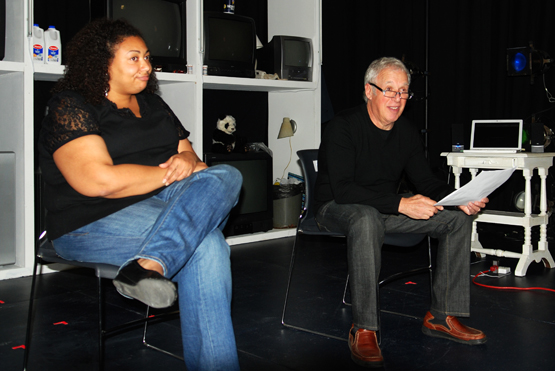One Class, One Day: Playwriting, with Accompaniment
Composing lyrics, and singing them, are the semester’s scariest hurdles

Class by class, lecture by lecture, question asked by question answered, an education is built. This is one of a series of visits to one class, on one day, in search of those building blocks at BU.
At three minutes past one, Richard Schotter’s classroom — a black box inside the Boston Playwrights’ Theatre — is empty. “I’m not sure where my students are,” the visiting professor of playwriting says, glancing at his watch. “They’re usually quite punctual.”
Moments later they arrive, flushed and ruddy. “You’re late,” Schotter chides.
The scolding generates a quick retort from Genevieve Jessee (GRS’10) that may or may not be true. “We were at the pub,” she says, “imbibing some liquid courage to get us through this class.”
“This class” is Exercises in Dramaturgy, a playwriting seminar for graduate students in BU’s Creative Writing Program. Students write 10-minute plays, which are performed and critiqued. Emphasis is placed on structure, language, and theme, and there’s a strong focus on creating a full narrative arc — beginning, middle, and end.
It’s all standard, save for one thing: lyric writing.
“It’s an important and distinguishing skill to have,” says Schotter, “because you never know when someone will ask you to write a musical.”
His students are less inclined to agree. “I warn them on the first day of class that one of the assignments is to write lyrics to two songs,” he says, “and there’s always a collective groan.”
Halfway through each semester, Schotter gives his students music with an upbeat tempo and a ballad, both composed by Berklee College of Music graduate Haddon Givens Kime. Guidelines are strict: the upbeat tempo must be about riding the T, and the ballad has to reflect on the past. Each song must have a narrative arc. And then? A live performance by the lyricist.
“What did everyone think of this assignment?” Schotter asks.
“It wasn’t bad at all,” quips Terry Byrne (GRS’10), “if you’re into waterboarding.”
John Zakrosky (GRS’10) boldly marches onto the stage. “I’ll go first,” he says, clearing his throat. “This is about a guy who thinks he’s a vampire, and he’s just met a girl who thinks she’s a volcano. And I can’t sing.”
His classmates chuckle as Schotter cues a laptop, and Zakrosky begins to tap his foot and sing — off-key.
Stop this train
I need to take flight
Don’t you understand
I’ve only got the night
I’ve got some investigating
Into the heat of lava to do
No more of these sucking blood blues.
The class applauds, and Zakrosky blushes. His peers’ verdict: the song is original, funny, and charming. But Schotter has suggestions. “Get rid of the extra syllables,” he says. “The song will flow better.”
Next up is Jessee, who prefaces her performance with a disclaimer. “I’m here for playwriting, not singing,” she says. “My song’s about a woman whose family is selling their farmhouse, and she’s walking through it and remembering her childhood.”
A sad melody fills the room, and Jessee sings in a light soprano voice, faltering only on the highest notes.
Here I lost my first tooth
There Daddy tracked how tall I grew
And now someone else will do
All the things we used to do
At home
Our home
We made this house a home
Now where will I belong?
No matter where it ends
The love we shared here
Will not lessen
Here I lost my first tooth
There Daddy tracked how tall I grew
And now
I understand the truth
Mama told me
It’s not under a roof
The love’s not lost
It’s housed in you
In you
Your home.
“I was so moved by ‘all the things we used to do at home, our home,’” Schotter says. “I thought it was a lovely hook. I kind of wish that you’d taken it even further. Ask yourself: how many times can I take this phrase and turn it like a prism, so other meanings emerge from it?”
Jessee glares at him, straight-faced. “Are you implying this isn’t Broadway-ready?” she asks. “Geez, what do you want from me?”
Anna Winget (GRS’10) takes a different approach. “Mine’s a duet,” she says, “between a Mormon missionary and a queer woman riding the T.”
Winget throws herself into the dual roles, standing with outstretched arms and singing soprano for the missionary, slouching in a chair and singing alto for the lesbian.
Oh, my Lord
What a lovely day
Thank you, Lord
To thee I humbly pray
All these people to be blessed
And baptized
Thank you, God
I feel you near
Doing your work
Yes, you’re right here
Together we’ll send high
The soul deprived.
For God’s sake
Oh, what’s she doing here?
Wait until
I tell her that I’m queer
Why’s it every time
I try to live my life
People always say
Look to the light
Save your soul
Or be in the cold
Change the way it is
Or it’s the end of days.
Complimentary coffee, dear?
Stick it up your rear
You’re really sweet
But I’m queer.
Schotter is impressed. “No one has written a duet before,” he says, “but there was no mention of the T.”
“I thought it was great that each character had her own vocabulary,” Jessee adds. “It really distinguishes the characters.”
The songs continue as each student takes a turn, with no one spared. Afterward, there seems to be consensus that while the exercise wasn’t awful, a songwriting career is not in anyone’s immediate plans.
Nevertheless, Schotter encourages everyone to revise.
“Writing a song is like crafting a fine piece of jewelry,” he says. “Polishing it is the pleasure, the pain, and the ultimate reward.”
Vicky Waltz can be reached at vwaltz@bu.edu.
This Series
Also in
One Class, One Day
-
November 30, 2018
Breaking Bad Director Gives CAS Class the Inside Dope
-
October 31, 2018
Trump and the Press: We’ve Been Here Before
-
August 3, 2018
A Scholarly Take on Superheroes

Comments & Discussion
Boston University moderates comments to facilitate an informed, substantive, civil conversation. Abusive, profane, self-promotional, misleading, incoherent or off-topic comments will be rejected. Moderators are staffed during regular business hours (EST) and can only accept comments written in English. Statistics or facts must include a citation or a link to the citation.